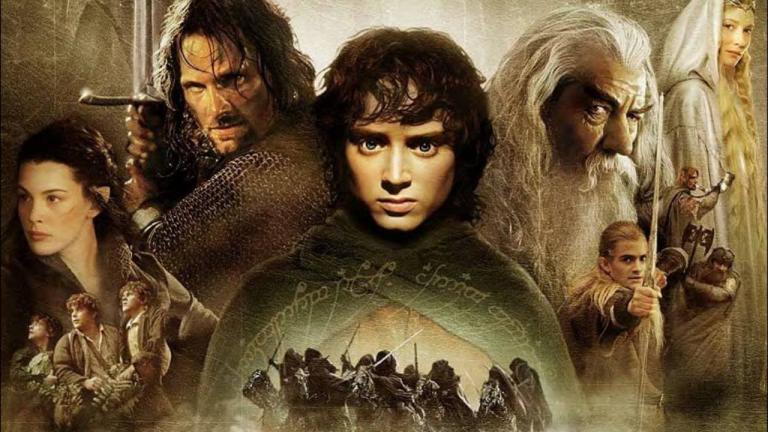A couple weeks ago some friends and I gathered for a Lord of the Rings marathon: all three movies back to back to back, complete with second breakfast, elevenes, lunch, dinner, and enough tea and ale to keep all the hobbits happy. It was a fun day – and a long day.
Tales of heroism – particularly from creatures as small and unlikely as hobbits – are popular with everyone. Pagans love the magical world and argue about where we’d rather live (sign me up for Rivendell). It’s even popular with political and religious conservatives, who like its anti-appeasement message and Christian themes (J.R.R. Tolkien was a devout Catholic).
Parts of Lord of the Rings are timeless, reflecting Tolkien’s skill at creating a British mythology to rival those of the Norse. But others are very much a part of Tolkien’s life and times, in particular his experiences as a soldier in World War I and as an English civilian in World War II.
In spending roughly 12 hours immersed in these films – and with current world events never far from my mind – it became apparent that there are some lessons in Lord of the Rings that we need to remember. And there are other lessons we’d do just as well to forget.
Lessons to forget
The good war. I’m a very late Baby Boomer who has always felt like I belong in Gen X. This generational liminality has let me see the Boomer generation (born 1946 – 1964) with my own eyes, while still retaining some objectivity. And one of the most troublesome traits of the Boomer generation is the desire – some would call it lust – for “our good war.”
Tolkien fought in World War I rather reluctantly and his stories reflect the horrors he experienced. But Lord of the Rings is clearly not an anti-war story. When various characters (most notably Eowyn) express a desire for glory – and then go out and achieve it – they’re setting a standard those who come after them feel obligated to reach.
The G.I. Generation won World War II, then they came home and built an economic empire. It’s a lot more complicated than that, but stay with me. The Boomers felt like they needed their “good war” to live up to their parents’ standards. Our failure in Vietnam only intensified those feelings (among some Boomers, that is – many other Boomers led the anti-war efforts). Is there any doubt that one of the reasons George W. Bush invaded Iraq was to live up to the image of his WWII veteran father?
There are no good wars. There are only necessary wars, and wars that can be avoided. We should honor those who fight and die and otherwise do what must be done. But lust for “our good war” only perpetuates conflict and suffering.
You always have to defeat evil. The kings of Middle Earth who attempt to stay out of the war are shown as weak and ineffective. No one seriously attempts to negotiate with Sauron. The message is clear: fight now or fight later, but you will fight or you will be crushed.
Tolkien fought in World War I, but he had a front row seat for World War II, including Prime Minister Neville Chamberlain’s Munich Agreement with Hitler that Chamberlain genuinely believed would prevent war. All that accomplished was giving Hitler more time to prepare.
Hitler could not be appeased – neither could Sauron. Both had to be utterly defeated.
But every conflict is not the Battle for Middle Earth and every conflict is not World War II. And every action has unintended consequences – particularly for imperial powers injecting themselves into matters that don’t concern them.
Many times the right course of action is not “defeating evil” but minding your own business and letting local and regional conflicts play out, painful as they may be to watch.
Because many times a Great Power can’t make things better, but they can make things much, much worse.
Destroy the ring and all is well. For all the many battles of Lord of the Rings, victory comes down to Frodo carrying the One Ring back to Mount Doom and throwing it into the fires from whence it came. Destroy the center of power (destroy the ring, kill Hitler, stake the head vampire) and all is well. Reality is rarely so simple.
A more accurate metaphor is the Greek story of the Hydra – cut off one head and two grow back. We killed Saddam Hussein and opened a vacuum filled by Daesh. We supported rebels in Syria and created millions of refugees.
In this country, we obsess over who will be President. But the United States was a not a liberal paradise during the years Barack Obama was President. And removing Donald Trump from office will not end our problems with nativism, racism, corporatism, and empire. Trump is a symptom, not the disease.
Simple solutions to complicated problems are attractive – that’s how Trump got elected. But simple solutions to complicated problems almost never work.
Lessons to remember
Fortunately, not all of the lessons of Lord of the Rings are things we’d be better off forgetting. Some are timeless lessons as valuable today as they were in the Third Age of Middle Earth.
Support your friends and keep your commitments. How many times did we see this? Frodo kept carrying the Ring even though it was killing him. Sam wouldn’t leave Frodo’s side and almost drowned making sure of it. It took working around incompetent bureaucrats, but Gondor called for aid and Rohan answered. The elves came to fight alongside men at Helm’s Deep. And on and on and on.
The Army of the Dead abandoned their oaths to Isildur and were cursed for it, but redeemed themselves by fighting for Aragorn.
As much as we love heroic individuals, even more we need people who will make commitments to their communities and to the world, and then keep them no matter what. Individually, none of us can stand against the Saurons and Sarumans of our world. Together, we can defeat them, or simply make them irrelevant in our lives.
There is always hope. Armies are outnumbered. Fortresses are impregnable. Secret entrances are guarded by fearsome creatures. The Nazgul cannot be killed by any man. Elves and dwarves prepare to die side by side, as friends.
“The men have said we will not live out the night. They say it is hopeless.”
“This is a good sword … and there is always hope.”
So long as we have breath, we have hope. Storms may end, help may arrive, enemies may make critical mistakes… and hobbits may complete an impossible task. Even if death is both imminent and certain (as it will be for all of us, sooner or later) we have the hope that we will join our ancestors in the Otherworld, and perhaps, return to this world in a future life.
There is always hope.
You can go back, but you’re never the same. Frodo makes it back to the Shire, but his wounds continue to hurt. My friends who’ve read the books (I’ve only seen the movies) tell me that in Tolkien’s novels, the Shire does not escape the war and is never exactly the same… appropriate for an author who lived through the Battle of Britain and the post-war rebuilding efforts.
Our experiences change us, and extreme experiences tend to change us extremely. I see this every time I go “home” to Chattanooga to visit family and friends. I can still get around without a map (most of the time) but the city is newer, cleaner, and more vibrant than when I lived there. It’s a much nicer place to live. But even being there for a weekend reminds me of how much I’ve changed. I could move back there, but I couldn’t pick where I left off – neither me nor the city are the same.

I’m already seeing some of this in my traveling companions from the most recent trip to Ireland and Wales. For four of them, this was their first trip to that part of the world. They are not the same people they were before we left. Their world has been expanded, and they’re growing with it. Travel changes you – almost always in a good way.
Conflict – whether armed conflict or political conflict or economic conflict – also changes you, and almost never in a good way.
Sometimes we want to go back (where ever “back” happens to be for you at the time) and sometimes we have to go back, but it’s never the same.
A Lord of the Rings marathon is a great way to spend a free day, particularly if it includes friends and food. The next time you watch the movies, see what lessons you need to remember, and what lessons you need to forget.


















